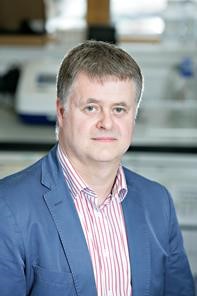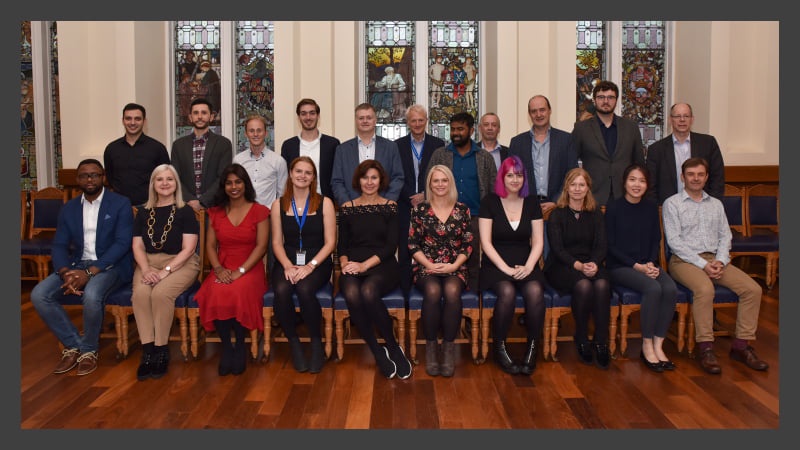
- About Us
-
Biologics continue to dominate the global pharmaceutical market, with monoclonal antibodies representing some of the top sellers and transforming the treatment of various indications through targeted and safe therapies.
The Scottish Biologics Facility (SBF) has developed an excellent reputation for generating antibodies from phage display libraries together with a variety of in-house “tool kits” specifically tailored to progress them to commercially viable assets.
By employing our bespoke selection strategies including Forced Epitope Selection (FESTM), lead monoclonal antibodies can be selected for diagnostic, imaging, therapeutic and reagent-tool purposes, from naïve or immunised phage display libraries.
The facility is set up within the University of Aberdeen, Foresterhill Health Campus, with dedicated labs for: molecular biology, phage work, antibody expression in mammalian and E. coli systems, purification, biochemical characterisation (including affinities) together with labs for functional characterisation of binders.
- History
-

The SBF also trains early career scientists (ECRs) and PhD students in antibody library selection (phage display) and further characterisation using biochemical and biological assays. The SBF has a keen research interest in novel biologic binders including bispecifics, potent antibody-based therapeutics against AMR infections and harnessing the power of antibody engineering to develop simple but effective solutions to the challenges faced globally in human health and environment.
- Team
-

Andy is Professor of Biotechnology and Director of the Scottish Biologics Facility (SBF), University of Aberdeen.
He has a wealth of experience working in both academia and industry. In 2005 became the first Ernst and Young Plc UK's Science and Technology Entrepreneur of the Year as the Founder and Chief Scientific Officer of Haptogen Ltd, which was acquired by Wyeth Inc in October 2007. Andy currently holds a number of non-executive Board positions within the Scottish biotechnology sector. In 2016 he was one of the founders of a new biologics drug discovery company Elasmogen Ltd, and is their part-time CTO and managing the patent portfolio and IP strategy. In 2020 he also took on the role Chair at Roslin Technologies Ltd.
Andy has been part of commercial teams/boards that have raised venture and City cash, closed a number of global licensing deals, and progressed protein-based drugs into late stage clinical trials, including Phase 2 trials in anti-infectives and a Phase 3 trial for lung cancer. Andy has been on the Board of NovaBiotics Ltd since 2009. NovaBiotics recently announced the successful completion of its Phase 2b Cystic Fibrosis trial for Lynovex™ and won EuropaBio's most innovative SME in 2017.
Andy has been a Fellow of the Royal Society of Edinburgh since 2006 and a Fellow of the Royal Society of Biology since 2012. He is currently VP Business at the RSE, Chairing their Economy and Enterprise Committee and sitting on the Enterprise Fellowship Committee.
Outside of bioscience, and with a team of young industry savvy entrepreneurs, Andy has helped establish a small portfolio of award-winning cocktail bars (top 200 in the world and often number 1 in Scotland) and opened Langstane Liquor Ltd in 2015, Aberdeen's first gin distillery for 100 years. Langstane now boast a global reach, selling in over 10 countries and 6 of the world's top ten cocktail bars.
Andy is a graduate of St Andrew's University, Scotland.

Dr Palliyil is the Head of Scottish Biologics Facility, where she leads a team of scientists and PhD students developing therapeutic and diagnostic monoclonal antibodies in the areas of Alzheimer's Disease (AD), Gram negative bacterial infections, fungal infections, chronic liver diseases and most recently COVID-19. Soumya did her MSc at the University of Aberdeen (UoA) funded by a British Council-Commonwealth Scholarship and continued with a knowledge transfer partnership (KTP) funded PhD developing high sensitivity sheep antibodies towards the quorum sensing molecules homoserine lactones (HSLs) in P. aeruginosa. The KTP project won the best partnership award in Scotland in 2011 and provided her with the opportunity to work within the protein therapeutics laboratories of pharma giants Wyeth and Pfizer Inc. She was also a recipient of the Royal Society of Edinburgh Enterprise fellowship.
In collaboration with TauRx Pharmaceuticals, a world leader in AD research with a Phase 3 drug in clinical trials, she has led the identification and characterisation of over 300 monoclonal antibody fragments with strong affinity (picomolar values) and high specificity towards a range of tau protein epitopes using sheep immunisation and recombinant antibody technology. These antibodies are covered by a family of overlapping patents and are now entering late-stage proof of concept clinical studies (diagnostic) on a state-of-the-art single molecule array Simoa platform and their therapeutic efficacy in preclinical models. She has extensive expertise in 'Forced Epitope Selection' techniques to develop antibody binders to specific epitopes of target proteins and has successfully led projects that generated monoclonal antibodies to the surface exposed epitopes of cell wall proteins in fungal pathogens, Sars-Cov-2 viral antigens and an 'internalising target' expressed on the surface of liver cells and activated during liver damage/disease. She has a special research interest in the discovery of novel, biologics based anti-infectives which can be developed as rapid point-of-care diagnostics and first-in-class therapeutics to tackle the global antimicrobial resistance crisis.
Dr Palliyil has several ongoing collaborations with national and international academic researchers and commercial organisations. She also teaches undergraduate and postgraduate students within the School of Medicine, Medical Sciences and Nutrition, delivering lectures in Industrial Biotechnology and Antibody Engineering and coordinating IMS MSc laboratory research projects.
- SBF 10th Anniversary Symposium 2019
-
The 10th anniversary of the Scottish Biologics Facility (2009-2019) was marked with a one-day science symposium which brought together a fantastic line up of speakers from across the biotech and pharma community. The day was filled with the experiences of pioneers in biologics and drug discovery sharing their scientific insights and ground-breaking career moments. All the day's speakers had a strong historical link to Scotland, Aberdeen and the City's long history as a centre of excellence for biologics research. Speakers included founders and CEOs from several successful UK biotech companies: TauRx Therapeutics Ltd, Iontas Ltd, Novabiotics Ltd. Programme leads from: GSK, TC Biopharm, Elasmogen Ltd, Iontas Ltd, and the Lead discovery centre with academic experts and key figures from the North East economic development (Life Sciences) board also contributing to the breadth of issues discussed.

